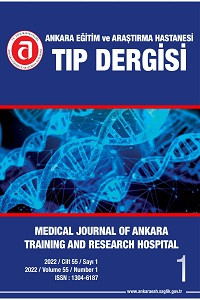Abstract
Bruselloz, Brucella cinsinin neden olduğu multisistem tutulumu olan enfeksiyöz bir hastalıktır. Menenjit, meningoensefalit, miyelit, radikülonörit, beyin apsesi, epidural apse ve meningovasküler sendromlar gibi nörolojik komplikasyonlara nadiren rastlanır. Sol abdusens sinir felci ve optik nörit ile başvuran bir bruselloz olgusunu sunuyoruz. Beyin omurilik sıvısı bulguları yüksek protein sayısı, düşük şeker düzeyi ve pleosistosis ile Brucella menenjitini gösterdi. Ayrıca beyin omurilik sıvısında Brucella aglütinasyon testi (Wright testi) 1/160 olarak bulundu. Brucella için serum aglütinasyon testi de 1/640'da pozitifti. Bu olguya abdusens ve optik sinirleri tutan nörobruselloz tanısı konuldu. Hasta seftriakson (intravenöz), siprofloksasin (oral) ve doksisiklin (oral) ile tedavi edildi. Tedaviden dört hafta sonra papil ödemi geriledi, sol gözdeki içe kayma, çift görme şikayetleri azaldı ve 12 hafta sonunda hastanın tüm bulguları düzeldi. 1 yıllık takipte nüks gözlenmedi. Brusellozun endemik olduğu bölgelerde çift görme şikayeti ile başvuran ve muayenesinde altıncı sinir felci olan hastalarda ayırıcı tanılar arasında nörobrusellozun düşünülmesi gerektiği kanaatindeyiz.
References
- Franco MP, Mulder M, Gilman RH, et al. Human brucellosis. Lancet Infect Dis. 2007; 12: 775 – 786
- Karsen H, Tekin Koruk S, Duygu F, et al. Review of 17 cases of neurobrucellosis: clinical manifestations, diagnosis, and management. Arch Iran Med 2012;15 (8):491-94.
- Yetkin MA, Bulut C, Erdinc FS, et al. Evaluation of the clinical presentations in neurobrucellosis. International journal of infectious diseases, 2006; 10(6), 446-452.
- Özkavukcu E, Tuncay Z, Selçuk F, et al. An unusual case of neurobrucellosis presenting with unilateral abducens nerve palsy: clinical and MRI findings. Diagnostic and Interventional Radiology, 2009;15(4), 236.
- Akdeniz H, Irmak H, Anlar O, et al. Central Nervous System Brucellosis: Presentation, Diagnosis and Treatment. Journal of İnfection 1998; 36: 297-301.
- Abd Elrazak M. Brucella optic neuritis. Arch. Intern. Med. 1991;/151:/776-8.
- Dean AS, Crump L, Greter H, et al. Clinical manifestations of human brucellosis: a systematic review and meta-analysis. PLoS Negl Trop Dis. 2012; 6(12), e1929.
- Bodur H, Erbay A, Akinci E, et al. Neurobrucellosis in an endemic area of brucellosis. Scand J Infect Dis 2003; 35:94-7.
- Buzgan T, Karahocagil MK, Irmak H, et al. Clinical manifestations and complications in 1028 cases of brucellosis: a retrospective evaluation and review of the literature. Int J Infect Dis 2010;14(6):e469-78.
- Goksel BK, Yerdelen D, Karatas M, et al. Abducens nerve palsy and optic neuritis as initial manifestation in brucellosis. Scand J İnfect Dis. 2006; 38(8), 721-725.
- Tanyel E. Nörobruselloz. Ortadoğu Tıp Dergisi, 2017; 9(1), 39-41.
- Erdem H, Ulu-Kilic A, Kilic S et al. Efficacy and tolerability of antibiotic combinations in neurobrucellosis: results of the Istanbul Study. Antimicrob Agents Chemother. 2012; 56.3: 1523-1528.
Abstract
Brucellosis is an infectious disease with multisystem involvement caused by the genus Brucella. Neurological complications including meningitis, meningoencephalitis, myelitis-radiculoneuritis, brain abscess, epidural abscess, and meningovascular syndromes are rarely encountered. We present a case of neurobrucellosis presenting with abducens nerve palsy and optic neuritis on the left side. Cerebrospinal fluid (CSF) findings indicated Brucella meningitis with high protein count, low sugar level and pleocystosis. In addition, Brucella agglutination test (Wright test) was found to be 1/160 in cerebrospinal fluid. Serum agglutination test for Brucella was also positive at 1/640. This case was diagnosed as brucellosis involving abducens and optic nerves. The patient was treated by ceftriaxone (intravenous), ciprofloxacin (orally) and doxycycline (orally). Four weeks after the treatment, the papilledema regressed, the left eye turned inward and double vision complaints decreased, and at the end of 12 weeks, all the patient's symptoms improved. No relapse was observed in the 1-year follow-up. We believe that neurobrucellosis should be considered among the differential diagnoses in patients with diplopia and sixth nerve palsy on examination in regions where brucellosis is endemic.
References
- Franco MP, Mulder M, Gilman RH, et al. Human brucellosis. Lancet Infect Dis. 2007; 12: 775 – 786
- Karsen H, Tekin Koruk S, Duygu F, et al. Review of 17 cases of neurobrucellosis: clinical manifestations, diagnosis, and management. Arch Iran Med 2012;15 (8):491-94.
- Yetkin MA, Bulut C, Erdinc FS, et al. Evaluation of the clinical presentations in neurobrucellosis. International journal of infectious diseases, 2006; 10(6), 446-452.
- Özkavukcu E, Tuncay Z, Selçuk F, et al. An unusual case of neurobrucellosis presenting with unilateral abducens nerve palsy: clinical and MRI findings. Diagnostic and Interventional Radiology, 2009;15(4), 236.
- Akdeniz H, Irmak H, Anlar O, et al. Central Nervous System Brucellosis: Presentation, Diagnosis and Treatment. Journal of İnfection 1998; 36: 297-301.
- Abd Elrazak M. Brucella optic neuritis. Arch. Intern. Med. 1991;/151:/776-8.
- Dean AS, Crump L, Greter H, et al. Clinical manifestations of human brucellosis: a systematic review and meta-analysis. PLoS Negl Trop Dis. 2012; 6(12), e1929.
- Bodur H, Erbay A, Akinci E, et al. Neurobrucellosis in an endemic area of brucellosis. Scand J Infect Dis 2003; 35:94-7.
- Buzgan T, Karahocagil MK, Irmak H, et al. Clinical manifestations and complications in 1028 cases of brucellosis: a retrospective evaluation and review of the literature. Int J Infect Dis 2010;14(6):e469-78.
- Goksel BK, Yerdelen D, Karatas M, et al. Abducens nerve palsy and optic neuritis as initial manifestation in brucellosis. Scand J İnfect Dis. 2006; 38(8), 721-725.
- Tanyel E. Nörobruselloz. Ortadoğu Tıp Dergisi, 2017; 9(1), 39-41.
- Erdem H, Ulu-Kilic A, Kilic S et al. Efficacy and tolerability of antibiotic combinations in neurobrucellosis: results of the Istanbul Study. Antimicrob Agents Chemother. 2012; 56.3: 1523-1528.
Details
| Primary Language | Turkish |
|---|---|
| Subjects | Clinical Sciences |
| Journal Section | Case report |
| Authors | |
| Publication Date | April 30, 2022 |
| Submission Date | July 7, 2021 |
| Published in Issue | Year 2022 Volume: 55 Issue: 1 |


